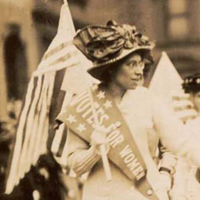However, since the civil rights movement of the 1960s, both popular attitudes and the nation’s understanding of the Constitution have shifted toward what Ritter calls the liberal-individual ideal of citizenship. Women are seen as autonomous, self-contained people in the public realm who are not dependent on anyone economically or politically.
“Much of American history has been about trying to move groups who were previously regarded as secondary to that independent status,” says Ritter. “This ideal promotes the separation of public selves from private lives.”
In fact, Ritter says many who follow the liberal-individual ideal want to completely erase gender or race from the country’s laws and politics. They would argue doing so is the only way to achieve true equality.
A New Ideal
However, Ritter cautions against the notion of leaving one’s personal experiences and identity at home.
“Neither of these versions of citizenship on their own is altogether positive,” she says. “It’s easier to criticize the domestic-dependent ideal, because it puts more limits on women’s opportunities. But, for most women, private lives and connections to their husbands and children matter a great deal to what they care about in politics.”
Instead, Ritter favors an approach that falls somewhere in the middle, which she calls the public-embodied ideal of citizenship.
“We need to provide people with equal rights unequivocally, but we also need to create more space for people to bring their social experiences with them into politics,” says Ritter.
Ritter explains this dilemma by examining the differing public perceptions of the three of the most visible women in American politics: Hillary Rodham Clinton, Condoleezza Rice, and Laura Bush.
Opponents criticize Clinton because she has distanced herself from traditional gender roles. Yet, the nature of American politics often makes that necessary in order for women to succeed in pulic office. On the other hand, Rice is not usually questioned about her gender role because she is not married and does not have any children. Finally, Laura Bush’s popularity does not appear to stem from her politics, but from the perception of her as a good wife and mother.
“For those who leave their gendered lives behind—such as Rice—our country offers great opportunities,” says Ritter. “But for those who struggle to mesh their pricate concerns with their public politics, as women political leaders with families often struggle to do, we provide less support and recognition for how those private interests matter to our public politics.”
The struggle to engage in the public realm without leaving one’s home life behind is as prevalent in the office cubicle as it is on Capitol hill. Work-life issues are a major concern for many employees, especially working mothers and fathers who have a difficult time being both a dedicated employee and a good parent.
“Most women with young kids work, but our work structures aren’t very accommodating of home and family life,” Ritter explains. “Many women feel deeply torn by this conflict, whether they work and have families, or choose to leave work to raise a family. I think we need to make it much easier for women and men to contribute to both their careers and their families during their adult lives.”
Ritter points out the United States is one of the few countries that does not offer paid parental leave. She predicts that work and family issues will play an increasingly significant role in the political arena.
What is Equality?
While the culture of modern-day America may have moved beyond the days when suffragist Susan B. Anthony was arrested for voting in a presidential election, ritter maintains these struggles are not so far removed. how the Constitution is interpreted has enormous power over what roles citizens inhabit in political and social communities.
“How do we understand women as part of our political community?” Ritter asks. “What does equality mean? does it mean treating you as an autonomous individual, or in the case of an issue such as family medical leave, does equality mean recognizing that you have responsibilities to care for dependents who impact your ability to pursue different kinds of economic opportunities?”
Ritter hopes equality can mean both.
“The issue is not, how can we treat everyone exactly the same, no matter who they are, but rather, how can we increase opportunities for everyone to participate fully in public life, wherever they’re starting from?”
